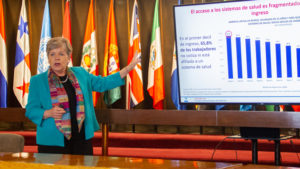ECLAC proposes a basic income to help most vulnerable population overcome the COVID19’s effects
The Economic Commission for Latin America and the Caribbean (ECLAC) presented a new report on the social challenges of the crisis stemming from COVID-19. In a context of low growth, a significant increase in poverty, extreme poverty and inequality is foreseen in Latin America and…
 The Economic Commission for Latin America and the Caribbean (ECLAC) presented a new report on the social challenges of the crisis stemming from COVID-19. In a context of low growth, a significant increase in poverty, extreme poverty and inequality is foreseen in Latin America and the Caribbean.
The Economic Commission for Latin America and the Caribbean (ECLAC) presented a new report on the social challenges of the crisis stemming from COVID-19. In a context of low growth, a significant increase in poverty, extreme poverty and inequality is foreseen in Latin America and the Caribbean.
To cope with the socioeconomic effects of the crisis caused by the coronavirus (COVID-19) disease, the ECLAC proposes that governments ensure immediate temporary cash transfers to meet basic needs and sustain household consumption, which will be crucial for achieving a solid and relatively quick reactivation. In addition, in the long term, the organization reiterates that these transfers should be made permanent, extending beyond people in situations of poverty and reaching the broad social strata of the population that are very vulnerable to becoming poor, which would enable moving towards a universal basic income to guarantee the basic right to survival, according to a new report unveiled today by the Commission’s Executive Secretary and SUN Lead Group Member, Alicia Bárcena.
The senior United Nations official presented the Special Report COVID-19 No. 3, entitled The social challenge in times of COVID-19, which gives an estimate of the social impact and related challenges that the current crisis is seen having for Latin American and Caribbean countries in the short, medium and long term. At a virtual press conference transmitted live from Santiago, Chile, Bárcena also revealed the details of ECLAC’s proposal for a basic emergency income (BEI) that should be implemented immediately, with a view to keeping it in place over time, depending on each country’s situation. This is especially relevant because overcoming the pandemic will take time and societies must coexist with the coronavirus, which will hamper the reactivation of the economy and production.
“The pandemic has exposed structural problems in the economic model and the failings of social protection systems and welfare schemes that are very costly to us today. Hence, we must move towards the creation of a welfare State based on a new social compact that takes into account fiscal, social and production-related matters,” Alicia Bárcena indicated.
ECLAC proposes providing a basic emergency income (BEI) equivalent to one poverty line (the per capita cost of acquiring a basic food basket and meeting other basic needs) over the course of six months to the entire population living in poverty in 2020 (meaning 215 million people, or 34.7% of the region’s population). This would entail additional spending of 2.1% of GDP to reach all the people who will find themselves in situations of poverty this year.
The report takes stock of the social effects that the COVID-19 pandemic is expected to have. In the short term, it will cause an increase in poverty, extreme poverty and inequality in the region, due to the context of low economic growth. Poverty in Latin America is seen increasing by at least 4.4 percentage points (28.7 million more people) in 2020 versus the previous year, reaching a total of 214.7 million people (34.7% of the region’s population). Among these people, extreme poverty is expected to rise by 2.6 percentage points (15.9 million more people) to end up affecting 83.4 million people in total.
Furthermore, in line with the increase in poverty and extreme poverty, inequality will also grow in all the region’s countries. ECLAC forecasts increases in the Gini index of between 0.5% and 6.0%. Once again, the worst results are expected in the region’s biggest economies.
The report adds that in this scenario of more poverty and inequality, broad strata of the region’s population are living in chronic conditions of economic insecurity and are very vulnerable to a loss in labor earnings. Thus, ECLAC estimates that around 10% of people who found themselves in situations of non-extreme poverty in 2019 (11.8 million people) will likely see their economic situations worsen and will suffer extreme poverty. A sharp deterioration in the position of people who belonged to the middle strata is also foreseen.
According to the report, the groups especially vulnerable to the socioeconomic crisis are women, people from low income and low-middle income strata, informal workers, paid domestic workers, children and adolescents, young people, older persons, the rural population, indigenous peoples, Afro-descendant people, persons with disabilities, migrants, and homeless people.